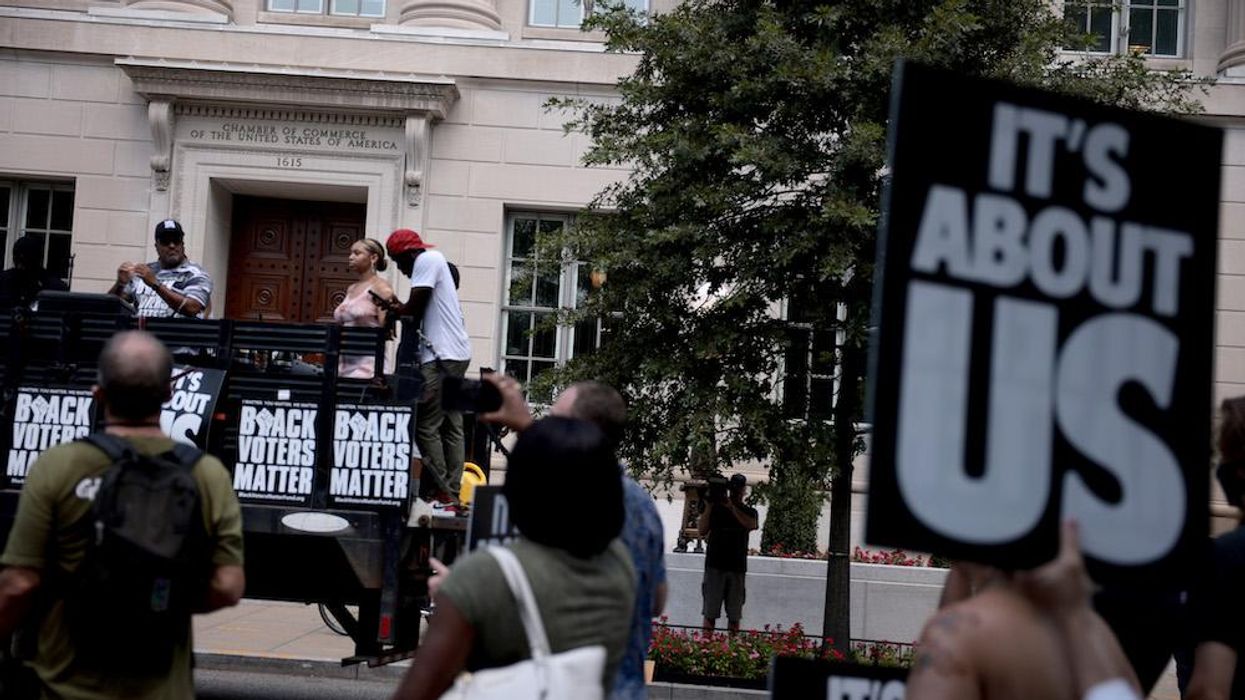
Photo by Anna Moneymaker/Getty Images

The left in America is pretty sure they know who exactly qualifies as black — and they've laid out pretty clear lines for what kind of thought, speech, and actions are permitted for U.S. minorities.
President Joe Biden declared during the 2020 election that the black community should be supporting him in the Democratic primary and claimed that "if you have a problem figuring out whether you're for me or Trump, then you ain't black."
Former EPSN host Jemele Hill tried to defend Biden's comments as "accurate" and also claimed that the then-candidate was just joking.
And New York Times writer Nikole Hannah-Jones, the creator of the highly criticized and racially tinged 1619 Project, also attempted to have Biden's back, writing in a now-deleted tweet, "There is a difference between being politically black and being racially black. I am not defending anyone, but we all know this and should stop pretending that we don't."
Any black politician, writer, entertainer, thinker, or commentator who dares step outside the lines gets labeled "white" or "Uncle Tom" and risks getting their "black card" pulled.
Just ask black Republican Larry Elder.
The Los Angeles Times ran an op-ed last week declaring Elder, who is seeking to replace California Gov. Gavin Newsom (D) in the Golden State's upcoming recall election, to be "the Black face of white supremacy."
Angel Eduardo, a black writer with Dominican roots, has had it with the treatment of black and brown Americans who don't toe the approved minority line.
In a piece for Newsweek on Monday titled, "Stop Calling Me 'White' For Having the Wrong Opinions," Eduardo took to task those who, throughout his life, have labeled him "white" for having the wrong tastes in music, clothing, and books.
"Growing up, I was often accused of being 'white.,'" Eduardo began. "My taste for Led Zeppelin and Queen over Puff Daddy and Busta Rhymes was called 'white.' My appetite for reading was called 'white.' Even my wardrobe, which failed to reflect the norms of late '90s hip-hop culture, was 'white.' It was intended as a pejorative, one that denied me my identity based on my cultural preferences."
It was painful, he said, adding that he was often accused of not acting Dominican.
"And in response to these insults, I made a clown of myself trying to get the 'right' clothes and force-feeding myself the 'right' music so that 'my people' would accept and include me," he wrote.
But his efforts didn't work, he said. "I was too different from my peers as a person. They mocked my manner of speaking, sneered at my sense of humor, and found these 'un-Dominican' things about me profoundly uncool."
Nothing has changed for Eduardo now that he's an adult.
"Today, I still find myself called 'white' as a pejorative, often to silence or shame me for speaking heresies," he said, then offering an example of being accused of being white for writing "human" in the race field in the paperwork for a workshop he was attending.
His accusers "didn't feel the need to find out whether I was actually 'white' or not," he wrote. "After all, the necessary evidence was in what I had written. It was inconceivable to those women that anyone voicing that sentiment could possibly be 'black' or 'brown.'"
"The idea that race—specifically, blackness—should entail a certain ideology or viewpoint and that veering from that viewpoint is a sign of unfortunate whiteness is, sadly, a common one," Eduardo lamented, then noting:
This penchant for taking away people's blackness if they don't agree with your politics is pernicious, a cynical gatekeeping that's as rampant as it is deplorable.
I call it the One Thought Rule: Disagree with the orthodoxy and your "of color" card gets revoked. Toe the line or your very being will be called into question by the ideological powers that be.
But he has a message for the thought police: "Well, my being doesn't belong to you, and you can't take it away from me."
"As for my 'of color' card, you can have it. It's meaningless to me anyway."
Not surprisingly, Hannah-Jones chimed in with reaction to Eduardo's piece, tweeting, "This was terrible, but seems the appetite is endless for the 'I don't consider myself Black but am mad Black people question my Blackness' 'think' pieces."
Eduardo replied, "You and I have gone back and forth before, Ms. Jones, and unfortunately in every single case you seemed unable to grasp the actual point I'm making."
"I encourage people to engage with what I'm actually trying to say, if they're so inclined," he added.